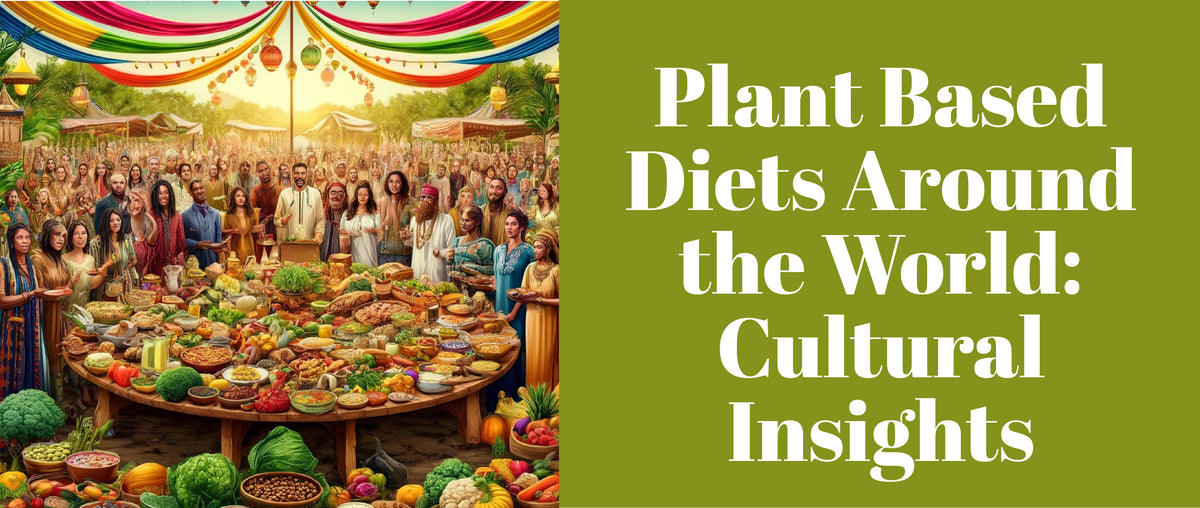The Rise of Plant Based Diets in Non Western Cultures
Plant based diets have been gaining significant popularity worldwide, driven by an increasing awareness of their health benefits, environmental impact, and ethical considerations. While much of the focus has been on the Western world, non Western cultures have a rich history of Plant based eating that is often rooted in cultural, religious, and environmental factors. This article explores the rise of Plant based diets in non Western cultures, highlighting the key drivers, health benefits, popular foods, and challenges faced in different regions.
Key Takeaways
- Plant based diets have historical roots in many non-Western cultures, driven by cultural, religious, and health reasons.
- These diets are increasingly popular due to their health benefits, including weight loss, muscle recovery, and overall well-being.
- Specific regions such as Asia, Africa, the Middle East, and South America have unique Plant based dietary practices.
- Common Plant based foods include high-protein snacks, low-calorie foods, vegan cheese, and kombucha.
- Challenges remain in terms of accessibility, affordability, and cultural acceptance, but technological advancements offer promising solutions.
Historical Background of Plant based Diets
Ancient Plant based Diets
Many non-Western cultures have long histories of Plant based eating. For instance, India's vegetarian traditions are rooted in Hinduism, Jainism, and Buddhism, which advocate for non-violence and compassion towards all living beings. Similarly, China has a rich history of plant based diet, influenced by Buddhism and Taoism, which emphasize balance and harmony with nature.
In Ethiopia, the Ethiopian Orthodox Church practices numerous fasting periods throughout the year, during which adherents follow a vegan diet. These practices have contributed to a rich culinary tradition centered on plant based foods like lentils, chickpeas, and various vegetables.
Evolution of Dietary Practices
Over time, these traditional diets have evolved and adapted to modern influences while retaining their core principles. In many non-Western cultures, Plant based eating is not a new trend but a continuation of long-standing dietary practices. This historical context provides a strong foundation for the current rise in Plant based diets.

Drivers of Plant Based Eating in Different Cultures
Cultural Influences
Cultural practices significantly influence dietary choices. In Japan, for example, the traditional diet, known as Washoku, emphasizes seasonal vegetables, tofu, and rice. This diet has been linked to longevity and low rates of chronic diseases. Similarly, in Vietnam, the emphasis on fresh herbs, vegetables, and rice noodles creates a naturally Plant based diet.
In Mexico, indigenous diets traditionally consisted of maize, beans, and squash, known as the Three Sisters. These foods are still staples in the Mexican diet, showcasing the deep cultural roots of Plant based eating.
Religious Motivations
Religious beliefs play a crucial role in the adoption of Plant based diets. In Islam, for example, Halal dietary laws encourage the consumption of Plant based foods, especially during fasting periods such as Ramadan. Similarly, in Ethiopia, the Orthodox Christian practice of fasting involves abstaining from animal products for nearly half the year, promoting a Plant based diet.
Health Benefits and Awareness
Increasing awareness of the health benefits associated with Plant based diets is driving their popularity. Studies have shown that these diets can reduce the risk of chronic diseases, aid in weight loss, and improve overall well-being. In countries like Thailand and Vietnam, traditional Plant based diets are being revisited and promoted for their health benefits.
Economic and Environmental Factors
Economic and environmental concerns are also significant drivers. In many developing countries, Plant based foods are more affordable and accessible than animal products. Additionally, the environmental impact of meat production, including deforestation and greenhouse gas emissions, is leading to a shift towards sustainable, Plant based diets.
Health Benefits of Plant based Diets
Impact on Overall Health and Longevity
Plant based diets are associated with numerous health benefits, including reduced risk of heart disease, hypertension, diabetes, and certain cancers. The high fiber content and abundance of vitamins, minerals, and antioxidants contribute to improved health and longevity.
Table: Health Benefits of Plant based Diets
| Health Benefit | Description |
|---|---|
| Reduced Risk of Heart Disease | Lower cholesterol levels and blood pressure. |
| Weight Loss | Lower calorie density and high nutrient content support weight management. |
| Improved Digestion | High fiber content promotes healthy gut bacteria and regular bowel movements. |
| Reduced Cancer Risk | High intake of fruits and vegetables linked to lower risk of various cancers. |
| Better Blood Sugar Control | Lower glycemic load helps manage and prevent diabetes. |
Benefits for Weight Loss
A Plant based diet can be highly effective for weight management. Foods such as legumes, whole grains, and vegetables are low in calories but high in nutrients, making them ideal for those looking to lose weight. Best foods for weight loss include leafy greens, cruciferous vegetables, and fruits like berries.
Also Read
Plant based Diets in Specific Non-Western Regions
Asia
Traditional Diets and Modern Adaptations
In Asia, countries like India, Japan, and China have a rich history of Plant based diets. Traditional Indian diets include a variety of lentils, vegetables, and whole grains, often prepared with aromatic spices. In Japan, the focus is on seasonal produce, soy products, and seaweed. Modern adaptations in these countries are incorporating global influences while maintaining traditional principles.
In South Korea, traditional dishes like bibimbap and japchae are naturally Plant based, featuring a variety of vegetables, tofu, and rice noodles. These dishes are gaining popularity worldwide for their health benefits and delicious flavors.
Africa
Cultural Significance and Dietary Patterns
African diets are diverse, with a strong emphasis on Plant based foods. In West Africa, for example, staples like yams, cassava, and plantains are central to the diet. These foods are rich in carbohydrates, fiber, and essential vitamins, supporting a healthy and balanced diet.
In North Africa, dishes like couscous and tagine often feature a variety of vegetables, legumes, and aromatic spices. These meals are not only nutritious but also culturally significant, reflecting the region's rich culinary heritage.
Middle East
Religious and Cultural Dietary Influences
In the Middle East, Plant based diets are deeply rooted in religious and cultural practices. Traditional dishes such as falafel, hummus, and tabbouleh are not only delicious but also nutritious. These foods provide a rich source of protein, fiber, and essential nutrients.
In Lebanon, the mezze culture emphasizes small, Plant based dishes that are shared among family and friends. This communal approach to eating fosters a sense of connection and well-being.
South America
Indigenous Practices and Contemporary Trends
South American countries like Peru and Brazil have a history of Plant based diets, influenced by indigenous practices. Quinoa, amaranth, and a variety of fruits and vegetables are staples in these regions. Contemporary trends are reviving these traditional foods, integrating them into modern diets.
In Mexico, the traditional diet of maize, beans, and squash continues to be a cornerstone of the cuisine. These foods are celebrated for their nutritional value and cultural significance.
Popular Plant based Foods in Non-Western Cultures
High Protein Snacks and Best Foods for Weight Loss
High protein snacks such as lentils, chickpeas, and quinoa are popular in many non-Western cultures. These foods not only provide essential nutrients but also support weight loss and muscle recovery.
Best foods for weight loss in non-Western cultures include leafy greens, cruciferous vegetables, and fruits like berries. These foods are low in calories but high in vitamins, minerals, and antioxidants.
Vegan Cheese and Other Dairy Alternatives
With the rise of Plant based diets, dairy alternatives like vegan cheese are becoming increasingly popular. These products are made from nuts, soy, and other Plant based ingredients, offering a healthy and delicious alternative to traditional dairy.
Table: Popular Dairy Alternatives
Table: Health Benefits of Plant based Diets
| Product | Main Ingredient | Benefits |
|---|---|---|
| Vegan Cheese | Nuts, soy | Lactose-free and rich in healthy fats. |
| Almond Milk | Almonds | Low in calories and high in vitamin E. |
| Coconut Yogurt | Coconut | Probiotic benefits and dairy-free. |
| Soy Milk | Soybeans | High in protein and calcium-fortified. |
Kombucha and Other Healthy Drinks
Kombucha, a fermented tea drink, is gaining popularity for its probiotic benefits and refreshing taste. Other healthy drinks include herbal teas, coconut water, and vegetable juices, which provide hydration and essential nutrients.
In Thailand, iced herbal teas made from ingredients like lemongrass and pandan are popular for their health benefits and cooling properties. These drinks are not only refreshing but also support overall wellness.
Challenges and Opportunities
Accessibility and Affordability of Plant based Foods
One of the major challenges in promoting Plant based diets is ensuring accessibility and affordability. In many regions, Plant based foods are more affordable than animal products, but in others, they can be cost-prohibitive. Addressing these disparities is crucial for widespread adoption.
Overcoming Cultural Resistance
Cultural resistance to Plant based diets can be a significant barrier. Education and awareness campaigns are essential to overcoming misconceptions and promoting the benefits of Plant based eating.
In some cultures, there is a strong association between meat consumption and social status or masculinity. Challenging these perceptions requires a multifaceted approach that includes education, community engagement, and highlighting the health benefits of Plant based diets.
Role of Technology and Innovation
Technological advancements and innovation in food production are creating new opportunities for Plant based diets. From lab-grown meats to innovative Plant based products, technology is driving the future of food.
Table: Technological Innovations in Plant based Foods
| Innovation | Description | Potential Impact |
|---|---|---|
| Lab-Grown Meat | Meat produced from animal cells without raising animals | Reduces environmental impact and animal cruelty. |
| Plant based Meats | Meat alternatives made from plants (e.g., Beyond Meat) | Provides familiar flavors and textures. |
| Vertical Farming | Growing crops in vertically stacked layers | Increases food production efficiency. |
| Fermented Foods | Using fermentation to enhance flavors and nutrition | Adds variety and health benefits. |
Conclusion
The rise of Plant based diets in non-Western cultures is a testament to the growing awareness of the health, environmental, and cultural benefits of these diets. As more people embrace Plant based eating, the potential for global impact is immense. By addressing challenges and leveraging opportunities, we can promote a healthier, more sustainable future.
If you are a vegan, looking to dine something vegan in your city, check out our list of vegan restaurants in India.










